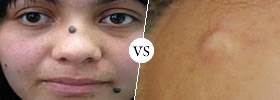Difference between Rosewood and Sheesham
Key difference: Rosewood refers to the wood of different trees, including trees from the Tipuana, Pterocarpus and Dalbergia genera of trees. Rosewood is essentially a type of hardwood. Rosewood is named as such due to the fact that the older trees have a very sweet and rich aroma, which is reminiscent of roses. Rosewood is best known for its dark brownish and/or reddish hue with darker veining. Sheesham is essentially a type of rosewood. It is sourced from the Dalbergia sissoo species of trees which is more commonly known as Indian Rosewood.
 Rosewood refers to the wood of different trees, including trees from the Tipuana, Pterocarpus and Dalbergia genera of trees. These genera contain various types of tropical or subtropical leguminous trees that are most commonly found in Central and South America, Africa, Madagascar and southern Asia.
Rosewood refers to the wood of different trees, including trees from the Tipuana, Pterocarpus and Dalbergia genera of trees. These genera contain various types of tropical or subtropical leguminous trees that are most commonly found in Central and South America, Africa, Madagascar and southern Asia.
Rosewood is essentially a type of hardwood. Hardwood is the wood that comes from an angiosperm tree. This is a type of tree that has seeds that are enclosed, be it in pods, a shell, a covering or in a fruit. For example, apples or nuts and seeds like acorns and walnuts. These types of seeds allow birds and insects to be attracted to the flowers of the tree and be able to carry the pollen to other trees. This is also the reason why hardwood trees are not often bunched together but are spaced apart and often have other trees in-between them.
Most hardwood trees are also deciduous is nature. A deciduous tree is a tree that loses its leaves annually. Hardwood trees are also slower to grow, taking their own time. Due to this, most hardwood is dense. This is also the reason that hardwood is expensive, as it takes longer to grow. Some famous hardwoods include maple, balsa, oak, elm, mahogany, and sycamore.
Rosewood is named as such due to the fact that the older trees have a very sweet and rich aroma, which is reminiscent of roses. This is especially true for the Brazilian or Rio rosewood.
Rosewood is best known for its dark brownish and/or reddish hue with darker veining. The rose wood has close, dense grain, which makes it strong and durable. Hence, the wood is used for making furniture, especially cabinets. The use of rosewood to make furniture date back hundreds of years, with many examples of antique rosewood furniture being available for viewing in museums today.
Some types of rosewood, such as Honduran rosewood, have an excellent resonance that makes them ideal for musical instruments like guitars, pianos and marimbas. Rosewood is also used to make handles, flooring, billiard cues, chess pieces, etc. In fact, handles made of rosewood resist shrinkage and are long-lasting.
Also, furniture made from rosewood can be left unfinished due to the rosewood’s natural color, lightly waxed, or heavily varnished and polished, as rosewood is able to take polish very well. This gives rosewood a more finished look.
Due to the popularity and subsequent high demand for rosewood, many species of tree belonging to the genus Dalbergia, from which most rosewood in the western world is sourced are now listed as either endangered or vulnerable by the ‘Convention on International Trade in Endangered Species of Wild Fauna and Flora’ or simply known as CITES.
 Sheesham is essentially a type of rosewood. It is sourced from the Dalbergia sissoo species of trees which is more commonly known as Indian Rosewood. The trees are deciduous in nature, and the wood is a hardwood. The tree is native to the Indian Subcontinent and Southern Iran. Regionally, the wood is referred to as sheesham, sisu, tahli, Tali, Irugudujava or jag.
Sheesham is essentially a type of rosewood. It is sourced from the Dalbergia sissoo species of trees which is more commonly known as Indian Rosewood. The trees are deciduous in nature, and the wood is a hardwood. The tree is native to the Indian Subcontinent and Southern Iran. Regionally, the wood is referred to as sheesham, sisu, tahli, Tali, Irugudujava or jag.
Sheesham or Shisham has become famous internationally as a premier timber species of rosewood. It is commonly used for making furniture, especially cabinets. This is mainly due to the fact that the wood is highly durable and long lasting. It is in fact decay resistant. The heartwood is extremely durable and is very resistant to dry-wood termites; however, a disadvantage of sheesham is that the sapwood is prone to woodboring beetles. Hence, the owner must ensure that the furniture is free of the beetles or its eggs and that piece of furniture is well maintained.
Sheesham is also used to make veneers and plywood. Additionally, it is also used to make musical instruments, specifically for percussion due to the resonance abilities of all rosewood. The Rajasthani percussion instrument, 'Kartaals' are often made of sheesham. Sheesham may also be used for flooring, agricultural tools, boatbuilding, carving, skis and turning objects. Furthermore, it is also commonly used as fuel and the tree is planted on roadsides, along canals and as a shade tree for tea plantations.
The heartwood of sheesham ranges from golden brown to a darker reddish brown, while the sapwood ranges from white to pale brownish white. Sheesham has a straight grain though it can be interlocked. The texture of Sheesham is medium to coarse with a good natural luster.
Image Courtesy: tjweb.org, true-furniture.co.uk









Add new comment